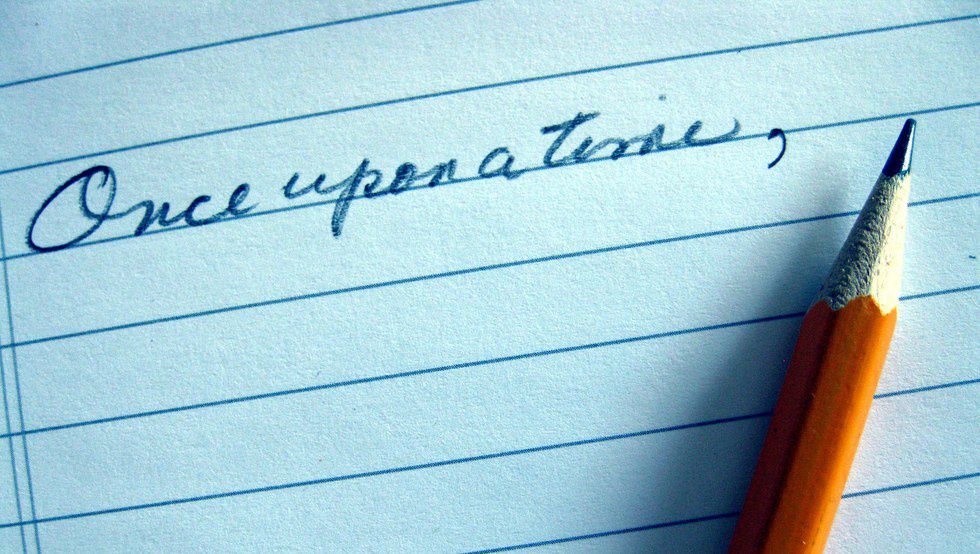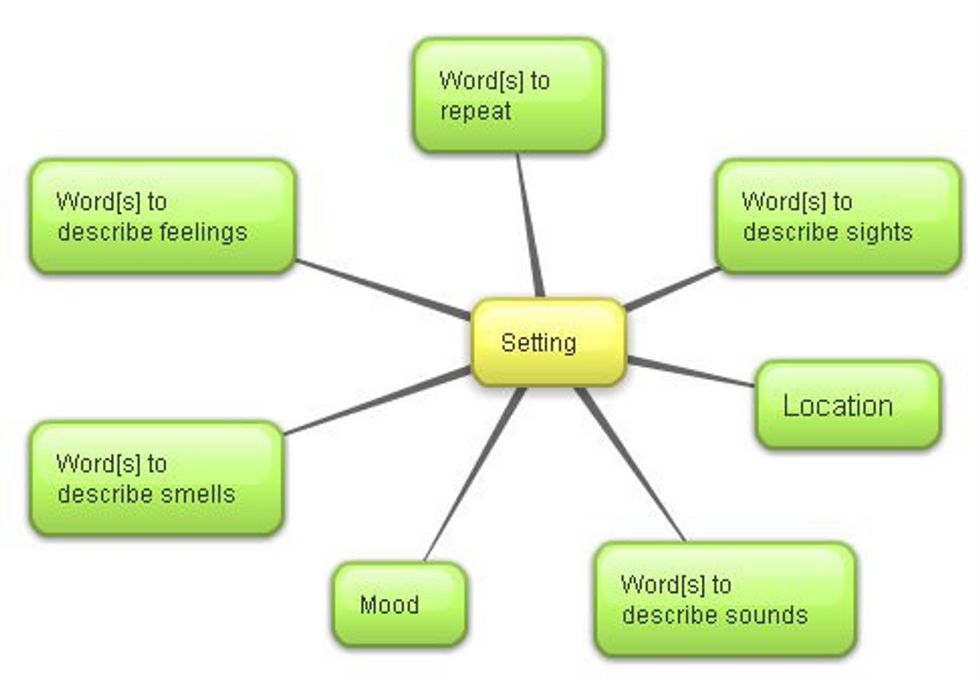The art of storytelling is everywhere. Either a child picks up a pencil and innocently recounts the thoughts in their head, a millennial writes yet another story they hope will get noticed, or an elderly person begins writing their anticipated seventh piece. By creating a story, the writer starts an adventure that they would never have imagined, full of lessons and emotional attachment. Not only does writing a story make someone feel important, but it could also connect with readers and make them feel something too.
While I believe that the true way to tell a story is from the heart, there are other ways to construct a piece that makes sense that is still full of passion. The basics of a story (who, what, where, when, why) should always be addressed and interweave flawlessly. Not only are those factors important, but also the characters (how they thrive/connect with basics), the setting (what it brings to the table), and the lesson (how to tie everything together).
Below is an outline that can direct a novice or an expert in how to consolidate a story or to even create a new one.
The Five W's
This is elementary style, and though it's very simple, it helps outline a story. By using broad details, the overall beginning of your piece begins. You know where to start, what to include, and how to make things smoother.
Who - List names of characters and three important personality traits you want them to have. Only do this for the characters who appear the most (five to seven people). Do not over analyze or add every attribute you want them to have- that will develop over time in the story.
Example: Lisa Smith: Teenager. Sarcastic, brave, booknerd.
What - What is going on in your story? Is there a conflict that umbrellas several other conflicts? Basically, what you want to do here is create a central conflict that directly effects not only the main characters but minor ones throughout the story. This is how to link everyone together and not make any plot holes. Do not make the basic conflict too difficult -- that's what the smaller problems are for.
Example: Conflict- Vampires raid town. Small conflict/effect- children are missing, main character is pulled into drama, and lives of hospital patients are at stake.
When - This is one of the easier ones. Choose what era (in this day in age it's usually modern, futuristic, or 80s) you want your story to take place in. Also, decide if the time period is relevant to the story, and if not, don't mention it too much. Seasons can also be placed here as a reference. If time is critical (if someone wakes up in the morning or there is a date at night), you have to make sure everything lines up. Because of this, I usually avoid specific times.
Example: Story takes place in the 1980s. "Cameron got into his car and turned on the radio. He shivered while searching for a station and when he found the new single by The Clash, his bad mood about winter slowly disappeared."
Where - This all depends on the genre of your story. If fiction, but taking place in a country, you can either use a real place or create your own (revolving around if setting and certain areas are important for the plot). If fantasy, this is all up to you- one can decide whether to construct a whole new land and then get specific, or just use one place as the central location. Just make sure that when characters or the plot shifts to a new town/place, each one has a distinct characteristic. This allows differentiation for the reader and lessens confusion.
Example: The two lands of Misa and Terra are at war over their beliefs on how to utilize the nearby training space. While Misa wants to make warriors skillful in hand-to-hand combat, the officials of Terra think that aerial tactics are more efficient. Their rivalry is making the kingdom frightful, since they have the two largest fleets and the enemy has just declared an invasion.
Why - Why are the characters doing what they're doing? Why is that happening? The fifth W is the most important, but also the most flexible. As long as it makes sense, you can resolve the conflict and answer (usually at the end or with the character's thoughts) why everything is going in the direction it is. Please don't overcomplicate or the audience will not understand.
Example: She gasped as the revelation came into her head. The government was covering up their tracks! The climate has caused so much problems that Earth is nearing it's end and they don't want anyone to know about it. That's why they keep taking all of the scientists!
Character Development
Creating a character is usually the best part of writing a story! What I've found is that writers unknowingly channel their inner self in their main character. It's apart of a complex, in which one hopes to make their own personality slightly better by creating a whole new person. Another thing that writers do is focus on is more physical attributes instead of personality and development. What I think is important is to center the story on the person and not the person's looks, because in a way readers cannot see them, but feel them.
When one introduces the main character, introduce their thoughts and hint at personality (if first person perspective) or visualize their aura, communicative pattern, and interests (if third person perspective). After the first introduction, there is no need to repeat the simple attributes of the character. Reveal new thoughts of the character or developing traits that weren't as strong in the beginning. The whole point of a character is to channel their thoughts and how they work to reach the ultimate lesson or climax you want to write about.
Main Character:
Personality: positives and negatives, strongpoints, how they can resolve conflict.
Physical: gender (if necessary), facial reveal, ability/disability.
Family/Friendship: their relationship with other characters, feelings about them, bias.
Flaws: what could create problem when trying to reach goal, their overall choices.
Interests: things they are interested could create development, connection with audience.
Setting: how they thrive in their setting, how they feel.
Setting and Connection
This is a really basic and easy topic to master. How does the setting that the book revolves around connect to the plot? Setting is a description of the story that is for visual interpretation and how the conflict arose. It also is an aspect for the character to react off of- it creates a chain reaction.
Lesson
No one writes a story without trying to prove a point. Whether it be about love, justice, life's decisions or anything else. The lesson is what brings the whole story together and shows the reason why the character or the plot followed a certain path. Unlike children's stories where the lesson is almost always in blaring colors so the reader can understand, other piece's have hidden themes. It's fun to have the audience dig deeper into the story in order to learn about what truly happened.
A lesson is what holds the story together and best of all, it justifies the actions of any character.
The Hook
The hook is present in all forms of writing, including stories and essays. It is a structure either in the first chapter or throughout the whole piece that keeps the reader intrigued. A hook strings the reader a long and then in a sentence or two, keeps them more captivated for what will happen next. This is also found at the end of chapters, also known as a cliff-hanger. It's a great way to make the audience keep reading or have them anticipate what will happen the next time they start.
Example: Esther walked past a group of trees, panting heavily. She just saw it. Where did it go? She swore she saw it run into the forest when it heard her laugh at Adam's joke. Continuing into the woods, Esther began to feel slightly fearful... she didn't know what that thing was capable of. As she was about to walk north toward the pond, she heard something behind her. Turning around slowly, she internally prayed nothing would happen. Another shake in the bush made her even nervous. Inching towards the movement, sweat formed over her eyebrow. Esther's hands moved the bush out of the way only for her to scream in terror!
Flow
The smoothness of a piece is key. Not only is it beneficial for the writer to have a story with good flow (it's easier to continuing writing that way), but it's also better for the audience. In order to truly understand what is going on, all of the sentences have to connect. A choppy sentence is a bad sentence that could leave the reader unsatisfied.
Picture this: your writing is an ocean, flowing and receding. It gives the audience information and then retreats, only to come back with more. However, your writing can't reach the shore, where visitors are relaxing, because it's low tide and the rocks (a choppy sentence) are blocking the waves. If one doesn't have sentence with flow, it could potentially effect the rest of the paragraph. Flow is the ultimate goal.
Humor?
No matter the genre, humor is always a good way to break tension or bring a smile to someone's face. Either you can designate a character to have the humorous personality that brings jokes or funny conversations to tense moments throughout the story or you can add humor into any paragraph where you want to make a break. Below are two examples in how to incorporate humor into a piece.
Example 1: My fist clenched with anger. I restrained myself from yelling at my so-called "friend". I couldn't believe Chris lied about going to find Sarah. We were supposed to go together!
Just when I was about to confront the situation, Nick said, "Hey guys... this looks like a really serious situation, but my mom just made meatloaf. Can we continue this later?"
Example 2: We were walking through the field looking for any evidence. Sadly we hadn't found anything in the three hours we were here and all of us were drained. Especially Thomas... he looked dead on his feet.
Just as I was going to ask if anyone needed a break, Thomas tripped and fell. Laying on the ground, he croaked, "Just leave me! Go! Save the world." Turning onto his back, he opened his eyes, saw all of us watching, and the immediately closed them- pretending to be dead.
After a second or two, we all started laughing. "I think that's our cue to go home. We can come back tomorrow," said Valerie. We all agreed and walked home, occasionally making jokes about how dirty Thomas was.
Plot and Chapters
I know of a lot of authors that like to just write and go where their stories take them. This method is OK, except it leads to a lot of writer's block. If you want to avoid this, I suggest making a broad outline. You don't have to write down every single detail, but if you jot down some key moments that you want to have in the plot, you can steer clear of writer's block. This can also be placed in intervals. You can write until you reach the first section of your outline. After thinking about what to do next and giving yourself a much needed break, you can restart the cycle.
Chapters are important because it divides the story into sections. This creates an organized story and can bring many things to a writer. It allows a break in the story, a pause, a signification of an end of a thought or day, or a cliff hanger. Chapters are a writer's and a reader's best friend.
Relevance
Last but not least: relevance. Though usually overlooked, this point is very important for a clear and concise piece. Everything that you write has to revert back to the plot, the conversation, or the topic at hand. Often times when something new is brought up, a writer likes to describe it in detail, veering off topic and creating disunity in the chapter. When you get to this point, summarize in a sentence- it'll allow the reader to understand what's going on and lessen the amount of irrelevance. If you ever worry about this, just think to yourself: does this paragraph have any significance to the topic?
These points will lead a new writer or an experience writer to a path of success and creativity. By following what has been listed, one's story will be so much more organized and interesting! The best part about writing is that there is an unlimited amount of thoughts that could be put into a piece. Anything that you think is important, write about it! Even if you don't have the time, write down the topic and idea and come back to it. You never know where it will take you.
What I listed above is a guideline for any storyteller. Hopefully it will fuel your imagination and push you to do something you've never thought of before. Remember, there is no such thing as a bad story.
Want to join our Odyssey team? Request an invite here and choose Temple University!

























